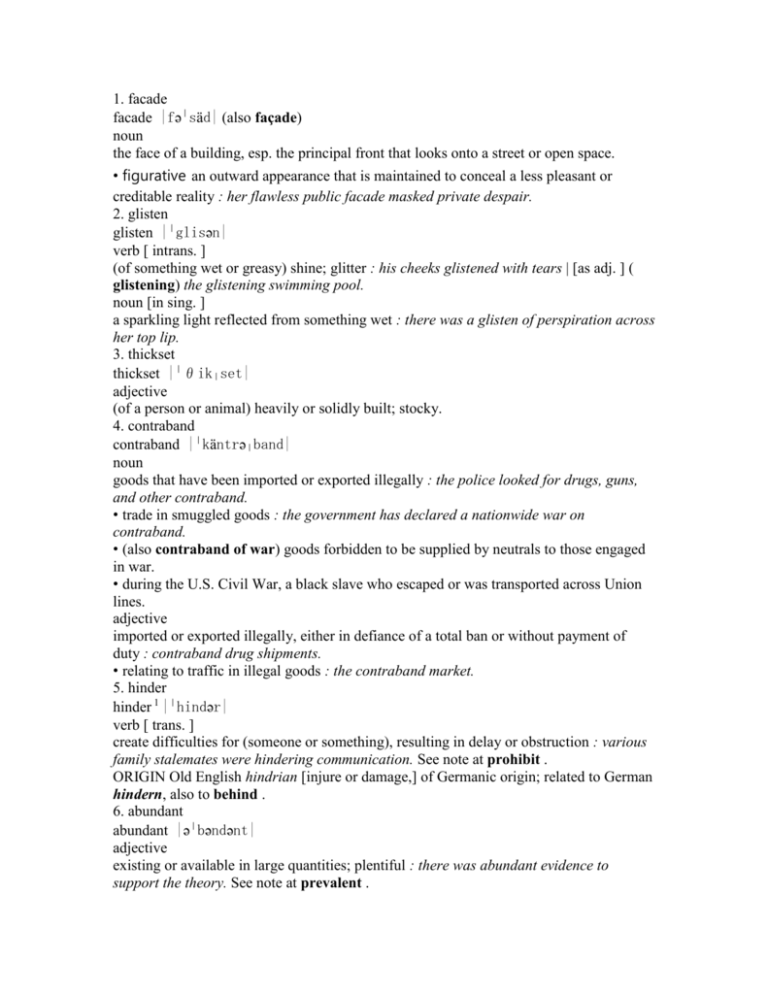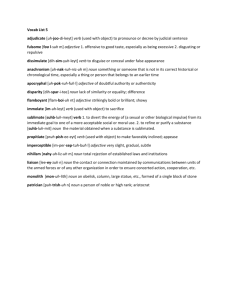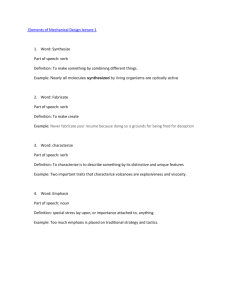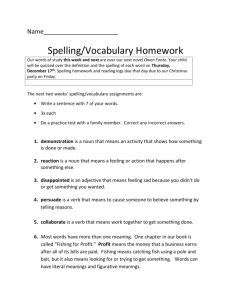1. facade facade |fəˈsäd| (also façade) noun the face of a building
advertisement

1. facade facade |fəˈsäd| (also façade) noun the face of a building, esp. the principal front that looks onto a street or open space. • figurative an outward appearance that is maintained to conceal a less pleasant or creditable reality : her flawless public facade masked private despair. 2. glisten glisten |ˈglisən| verb [ intrans. ] (of something wet or greasy) shine; glitter : his cheeks glistened with tears | [as adj. ] ( glistening) the glistening swimming pool. noun [in sing. ] a sparkling light reflected from something wet : there was a glisten of perspiration across her top lip. 3. thickset thickset |ˈθikˌset| adjective (of a person or animal) heavily or solidly built; stocky. 4. contraband contraband |ˈkäntrəˌband| noun goods that have been imported or exported illegally : the police looked for drugs, guns, and other contraband. • trade in smuggled goods : the government has declared a nationwide war on contraband. • (also contraband of war) goods forbidden to be supplied by neutrals to those engaged in war. • during the U.S. Civil War, a black slave who escaped or was transported across Union lines. adjective imported or exported illegally, either in defiance of a total ban or without payment of duty : contraband drug shipments. • relating to traffic in illegal goods : the contraband market. 5. hinder hinder 1 |ˈhindər| verb [ trans. ] create difficulties for (someone or something), resulting in delay or obstruction : various family stalemates were hindering communication. See note at prohibit . ORIGIN Old English hindrian [injure or damage,] of Germanic origin; related to German hindern, also to behind . 6. abundant abundant |əˈbəndənt| adjective existing or available in large quantities; plentiful : there was abundant evidence to support the theory. See note at prevalent . • [ predic. ] ( abundant in) having plenty of something : the riverbanks were abundant in wild plants. 7. scythe scythe |sīð| noun a tool used for cutting crops such as grass or wheat, with a long curved blade at the end of a long pole attached to which are one or two short handles. verb [ trans. ] cut with a scythe. • [ intrans. ] move through or penetrate something rapidly and forcefully : attacking players can scythe through defenses. 8. dismantle dismantle |disˈmantl| verb [ trans. ] (often be dismantled) take to pieces : the engines were dismantled and the bits piled into a heap figurative : the old regime was dismantled. 9. mobile mobile adjective |ˈmōbəl; -ˌbēl; -ˌbīl| able to move or be moved freely or easily : he has a major weight problem and is not very mobile | highly mobile international capital. • (of the face or its features) indicating feelings with fluid and expressive movements : her mobile features working overtime to register shock and disapproval. • (of a store, library, or other service) accommodated in a vehicle so as to travel around and serve various places. • (of a military or police unit) equipped and prepared to move quickly to any place it is needed : mobile army combat units. • able or willing to move easily or freely between occupations, places of residence, or social classes : an increasingly mobile and polarized society. noun |ˈmōˌbēl| a decorative structure that is suspended so as to turn freely in the air. 10. restraint restraint |riˈstrānt| noun 1 (often restraints) a measure or condition that keeps someone or something under control or within limits : decisions are made within the financial restraints of the budget. • the action of keeping someone or something under control. • deprivation or restriction of personal liberty or freedom of movement : he remained aggressive and required physical restraint. • a device that limits or prevents freedom of movement : car safety restraints. 2 unemotional, dispassionate, or moderate behavior; self-control : he urged the protestors to exercise restraint. • understatement, esp. of artistic expression : with strings and piano, all restraint vanished. 11. hobble hobble |ˈhäbəl| verb 1 [ intrans. ] walk in an awkward way, typically because of pain from an injury : he was hobbling around on crutches. • figurative proceed haltingly in action or speech : inertia and habit will keep it hobbling along. 2 [ trans. ] (often be hobbled) tie or strap together (the legs of a horse or other animal) to prevent it from straying. [ORIGIN: variant of hopple .] • cause (a person or animal) to limp : Johnson was still hobbled slightly by an ankle injury. • figurative be or cause a problem for : cotton farmers hobbled by low prices. noun 1 [in sing. ] an awkward way of walking, typically due to pain from an injury : he finished the game almost reduced to a hobble. 2 a rope or strap used for hobbling a horse or other animal. 12. ornate ornate |ôrˈnāt| adjective made in an intricate shape or decorated with complex patterns : an ornate wrought-iron railing. • (of literary style) using unusual words and complex constructions : peculiarly ornate and metaphorical language. • (of musical composition or performance) using many ornaments such as grace notes and trills. 13. scuffle scuffle |ˈskəfəl| noun 1 a short, confused fight or struggle at close quarters : there were minor scuffles with police. 2 an act or sound of moving in a hurried, confused, or shuffling manner : he heard the scuffle of feet. verb [ intrans. ] 1 engage in a short, confused fight or struggle at close quarters : the teacher noticed two students scuffling in the corridor. 2 [with adverbial of direction ] move in a hurried, confused, or awkward way, making a rustling or shuffling sound : a drenched woman scuffled through the doorway. • [ trans. ] (of an animal or person) move (something) in a scrambling or confused manner : the rabbit struggled free, scuffling his front paws. 14. devastate devastate |ˈdevəˌstāt| verb [ trans. ] destroy or ruin (something) : the city was devastated by a huge earthquake | bad weather has devastated the tourist industry. See note at ravage . • cause (someone) severe and overwhelming shock or grief : she was devastated by the loss of Damian. 15. stark stark |stärk| adjective 1 severe or bare in appearance or outline : the ridge formed a stark silhouette against the sky. • unpleasantly or sharply clear; impossible to avoid : his position on civil rights is in stark contrast to that of his liberal opponent | the stark reality of life for deprived minorities. 2 [ attrib. ] complete; sheer : he came running back in stark terror. • rare completely naked. 3 archaic or poetic/literary stiff, rigid, or incapable of movement : a human body lying stiff and stark by the stream. • physically strong or powerful : the dragoons were stark fellows. 16. lumber lumber 1 |ˈləmbər| verb [ intrans. ] move in a slow, heavy, awkward way : a truck filled his mirror and lumbered past | [as adj. ] ( lumbering) Bob was the big, lumbering, gentle sort | figurative a lumbering bureaucracy. ORIGIN late Middle English lomere, perhaps symbolic of clumsy movement. lumber 2 noun 1 timber sawn into rough planks or otherwise partly prepared. 2 chiefly Brit. articles of furniture or other household items that are no longer useful and inconveniently take up storage space. : [as adj. ] a lumber room. • figurative a collection of beliefs or concepts that are regarded as no longer valid and encumber one's mental outlook. verb 1 [ intrans. ] [usu. as n. ] ( lumbering) cut and prepare forest timber for transport and sale : the traditional resource industries of the nation, chiefly fishing and lumbering. 2 [ trans. ] (usu. be lumbered with) Brit., informal burden (someone) with an unwanted responsibility, task, or set of circumstances. 17. alter alter |ˈôltər| verb change or cause to change in character or composition, typically in a comparatively small but significant way : [ trans. ] Eliot was persuaded to alter the passage | nothing alters the fact that children are our responsibility | [ intrans. ] our outward appearance alters as we get older | [as adj. ] ( altered) an altered state. • [ trans. ] make structural changes to (a building) : plans to alter the dining hall. • [ trans. ] tailor (clothing) for a better fit or to conform to fashion : skirts with the hemlines altered a dozen different times. • [ trans. ] castrate or spay (a domestic animal). 18. invincible invincible |inˈvinsəbəl| adjective too powerful to be defeated or overcome : an invincible warrior. DERIVATIVES invincibility |-ˌvinsəˈbilitē| noun invincibly |-blē| adverb 19. skinflint skinflint |ˈskinˌflint| noun informal a person who spends as little money as possible; a miser. 20. construct construct verb |kənˈstrəkt| [ trans. ] build or erect (something, typically a building, road, or machine) : a company that constructs oil rigs. • form (an idea or theory) by bringing together various conceptual elements, typically over a period of time : Ptolemy combined his interests to construct a theory in support of Aristotle. • Grammar form (a sentence) according to grammatical rules. • Geometry draw or delineate (a geometric figure) accurately to given conditions. noun |ˈkänˌstrəkt| an idea or theory containing various conceptual elements, typically one considered to be subjective and not based on empirical evidence : history is largely an ideological construct. • Linguistics a group of words forming a phrase. • a physical thing that is deliberately built or formed. 21. willowy willowy |ˈwilōē| adjective 1 bordered, shaded, or covered by willows : willowy meadow land. 2 (of a person) tall, slim, and lithe. 22. slaughter slaughter |ˈslôtər| noun the killing of animals for food. • the killing of a large number of people or animals in a cruel or violent way; massacre : the slaughter of 20 peaceful demonstrators. • informal a thorough defeat : an absolute slaughter by the Red Sox. verb [ trans. ] (usu. be slaughtered) kill (animals) for food. See note at kill . • kill (people or animals) in a cruel or violent way, typically in large numbers : innocent civilians are being slaughtered. • informal defeat (an opponent) thoroughly : our team was slaughtered in the finals. 23. cultivate cultivate |ˈkəltəˌvāt| verb [ trans. ] 1 prepare and use (land) for crops or gardening. • break up (soil) in preparation for sowing or planting. • raise or grow (plants), esp. on a large scale for commercial purposes. • Biology grow or maintain (living cells or tissue) in culture. 2 try to acquire or develop (a quality, sentiment, or skill) : he cultivated an air of indifference. • try to win the friendship or favor of (someone) : it helps if you go out of your way to cultivate the local people. • [usu. as adj. ] ( cultivated) apply oneself to improving or developing (one's mind or manners) : he was a remarkably cultivated and educated man. 24. scanty scanty |ˈskantē| adjective ( scantier , scantiest ) small or insufficient in quantity or amount : scanty wages. • (of clothing) revealing; skimpy : the women looked cold in their scanty gowns. 25. catapult catapult |ˈkatəˌpəlt; -ˌpoŏlt| noun a device in which accumulated tension is suddenly released to hurl an object some distance, in particular • historical a military machine worked by a lever and ropes for hurling large stones or other missiles. • a mechanical device for launching a glider or other aircraft, esp. from the deck of a ship. • chiefly Brit. a slingshot. verb [ trans. ] hurl or launch (something) in a specified direction with or as if with a catapult : the plane was refueled and catapulted back into the air again | the explosion catapulted the car 30 yards along the road | figurative their music catapulted them to the top of the charts. • [ intrans. ] move suddenly or at great speed as though hurled by a catapult : the horse catapulted away from the fence.








